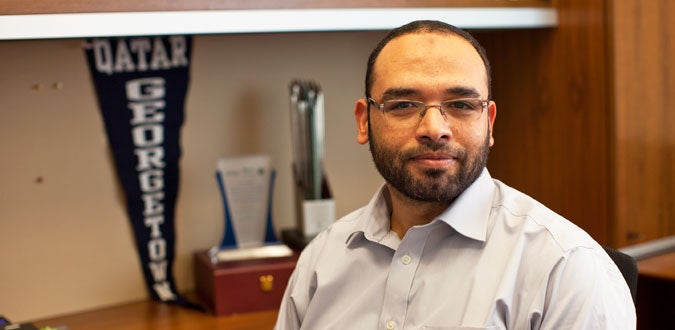Science and Religion at a Crossroads

A conference at Georgetown University in Qatar (GU-Q) will bring the often controversial issues surrounding science, religion, and the world of medical treatment and research, or “bioethics”, to the forefront of public discussion today. The two-day symposium, which will run from March 3-4, 2014, will feature a workshop and several panels on its main theme, “The Human Person: Challenges for Science, Religion and Governance.” The event will provide an opportunity for greater scholarly collaboration between the participating leading scholars and experts from the United States, Europe, and the Middle East, in exploring Muslim, Catholic, and secular approaches to the understanding of bioethics.
“This conference addresses some of the important implications of biomedical technology on our understanding of human nature and human relationships,” explained Dr. Ayman Shabana, Director of the Islamic Bioethics Project at GU-Q, which organized the event in cooperation with the Contending Modernities initiative at the University of Notre Dame (U.S.A.). “One of the main goals of the Islamic Bioethics Project at Georgetown University in Qatar,” he continued, “is to raise awareness about pressing bioethical issues and to facilitate dialogue among researchers and scholars from different academic, intellectual, and religious backgrounds in order to further the understanding of these issues at the local, regional, and international levels.”
Scott Appleby, Professor of History and Director of the Contending Modernities project at the Kroc Institute for International Peace Studies at the University of Notre Dame, explained why this conference is important, noting that “Developments in medical technology, neuroscience and related areas are unfolding at a dizzying pace, with profound implications for our understanding of the human person. There is a need for humankind’s great religious as well as secular traditions to have a voice in the bioethical and social justice questions raised by these developments.”
Program topics include the scope and boundaries of Shari’a law in medical legal and ethical issues, referred to as “Islamic Bioethics”, the social and legal definition of “human personhood”, and the challenges of neuroscience. Dr. Gerd Nonneman, the dean of Georgetown University in Qatar, said: “The ethical questions that will be discussed at this conference, such as the difficult life-and-death issues surrounding use of new technologies that push the boundaries of life support, and understanding how the science of genetics is shaping conceptions of the human person, affect all of humanity regardless of national, cultural or religious boundaries. Hosting this event here at Georgetown’s Doha campus demonstrates a cross-cultural commitment to constructive dialogue on these pressing issues, and builds on Georgetown University’s long-standing expertise in the field of ethics and our on-going work on bioethics and Islam.”
The opening session will be chaired by Ayman Shabana, and the keynote will feature Osman Bakar, from the Universiti Brunei Darussalam, speaking on the topic of The Human Person: Challenges for Religion, Science, and Governance and Prospects for Common Responses.
For more information about the conference, or to attend the public portion of the 2 day event, please visit qatar.sfs.georgetown.edu.